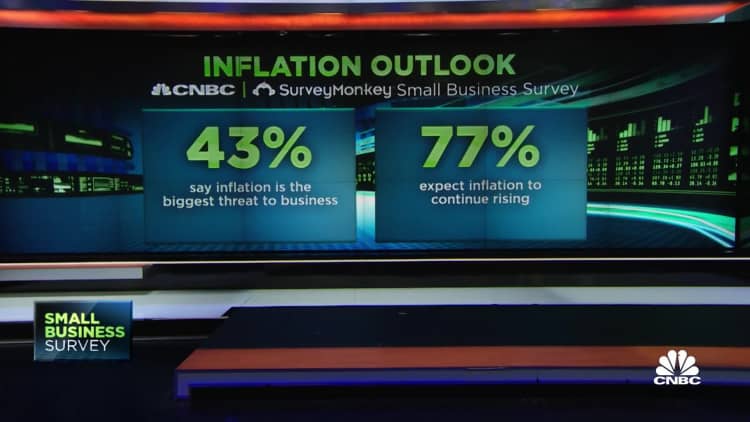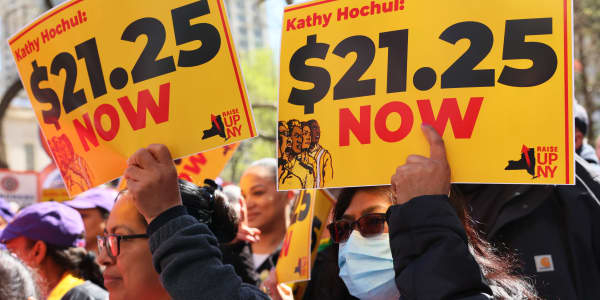The Federal Reserve chair Jerome Powell said on Friday there will be "pain" to come in the economy as a result of the central bank's battle with inflation, and right now, small businesses are experiencing that pain on both sides of the fight.
Inflation has been the No. 1 concern of small businesses for some time, as high prices in raw materials, labor, energy and transportation cut into margins. Higher rents, and landlords feeling more aggressive the farther away the nation moves from the peak of Covid, have compounded the hit from inflation being felt on Main Street. While there are some signs of inflation easing across the economy, that's because the Fed is intentionally cooling demand, and that has small business owners anticipating a sales decline.
What does it all add up to? According to a new national survey of small business owners by Alignable, a big jump in August in the percentage of small business owner who couldn't pay full rent in August.
Nationally, apartment rental prices, which have soared, are among the inflation indicators that may have recently peaked. But the Alignable data shows that the rent inflation crisis for small businesses is actually getting worse. Forty percent of small business said they could not pay their rent in full this month, up 6% month over month and setting a record for 2022.
"I've been following this closely every month since March 2020, and I was shocked," said Chuck Casto, head of research and communications for Alignable.
The percentage of small business owners unable to make rent hasn't been this high since March 2021. "This is a number we would have expected right in the middle of the pandemic, when a third of places were shut down, everyone was wearing masks or not going out to restaurants," Casto said.
Alignable's poll was conducted from August 13-August 22 among 7,331 randomly selected small business owners.
It is not new that inflation has become a much bigger concern than Covid on Main Street, but until it eases "and eases significantly," Casto said, all the small business costs are adding up to another existential crisis for Main Street, highlighted by the concerns over rent.
Forty-five percent of small business owners surveyed by Alignable say they're paying at least 50% more in rent than they did prior to Covid. Twenty-four percent say their landlords have doubled rent; 12% say they are now paying three times more.
Back to peak Covid concerns about business survival
The Alignable data also shows that many small business are still struggling to get back to pre-Covid revenue levels, just as the Fed is taking steps that are slowing overall demand. Casto said Alignable would hope that the numbers would be trending down among small business owners who say they have not returned to pre-Covid sales marks, but that's not happening now. Last December, amid the critical holiday season for many small businesses, 43% said they were "fully back," according to Alignable. "It's 23% now," Casto said, "and has just been slipping. ... even people who thought they were out of the woods in December or January, all of a sudden they're not."
That's the worst this indicator has been in over a year, according to Alignable.
The Alignable data matches the recent CNBC|SurveyMonkey Small Business Survey in mood, which showed small business confidence hitting an all-time low. And Casto says the rent data is critical because it is a tell about the full picture of what is going on with the finances of small businesses.
Alignable asks small businesses if inflationary pressures including increased rent could jeopardize their ability to stay open over the next six months, and while that data point has not changed considerably in August, it remains uncomfortably high, at roughly 47%-48%. Of that, 20% are "highly concerned."
As recently as the spring, that figure was as low as 28%.
Casto said that's the key figure he will be watching in the months ahead alongside the data on ability to pay rent.
"Many of them still haven't bounced back from Covid, and then you have inflation on top of it, and then, whether you consider this a recession or not, we have an economic slowing and consumer spending down," he said.
The CNBC small business survey found that expectations of lower sales were the biggest contributor to the quarterly decline in confidence, and many small business owners believe the recession has already begun.
"We're definitely seeing things recede in terms of activity and customer counts in stores," Casto said. The inability to get back to pre-Covid sales in terms of monthly revenue generated doesn't even take into account the extra expenses that inflation has created and a slowing economy. "It's a combination of everything ... everything builds on itself," he added.
Real estate options to consider
It's not all bad news on Main Street. By some recent measures, many small businesses in the service sector, in particular, are doing better and benefitting from the shift in consumer behavior from goods to services purchases. That's what Intuit data shows, and small business is its biggest lines of business. But the Alignable data on rent shows that the impact of inflation remains broad across sectors of the small business economy, even as some sectors are getting hitter harder and faster than others. In real estate, 40% of small businesses said they couldn't make rent in August, up from 18% last December.
"Lots of storefronts, even in fancy towns, are no longer there," Casto said. "We're not quite to ghost town level, but we're worried. ... We're at another level of 'paying rent or not paying rent'. ... It's a much bigger issue."
There are options for small businesses that are facing a rent crisis. One is negotiating with landlords, though that is getting tougher to do the farther away we move from peak Covid.
"Landlords feel like they let it slide for a year and a half and did everything they could, but now, two years in the hole, need to start asking for money," Casto said. "Because they could lose their buildings, they are paying mortgages."
Comments Alignable is receiving from small business owners it surveyed show that more are afraid to ask landlords at this point for even more rent relief, and landlord patience after the past two years is running thin. But the survey also indicates that many landlords still prefer to have a tenant making a good faith effort to pay rent, and catch up on any past due rent, than face an empty storefront during the economic slowing.
"Sometimes these landlords are happy to have the place filled even if it is just getting a portion of the rent, it's better than not getting any of it," Casto said.
For business to business owners, he recommends at least considering the ability to go fully remote, and take that overhead from real estate and apply it to other areas of the business. This is a move that Alignable says more B2B owners are making, according to the comments it receives in with the survey data.
The situation makes the fourth quarter, always the most critical for B2C small businesses, and for whom rent is now the No. 1 or No. 2 issue, even more important this year. Small businesses always count on holiday sales to be the biggest sales period of the year, and that's no different this year, but it's jut escalated to make-or-break for many businesses.
As the Fed seeks a "soft landing" for an economy it says has not entered a recession, there is the chance that if inflation's trajectory continues lower, that will mean lower costs across the board for small businesses, and a potential equilibrium point for Main Street could be reached between a smaller hit on margins and the lower sales that will come with a weaker economy. Small businesses have been adjusting for these past few years, pivoting during the pandemic, taking on side gigs to make their financials work (sometimes more than one), and in some cases, retiring earlier than expected (those numbers are up, too). But if there's a soft landing for Main Street, it's not likely to be apparent until after the end of this year.
"We've heard from small businesses they are counting on Q4," Casto said. "Q4 will really be telling, and if these numbers don't improve in Q4, I don't even want to say what could happen based on what I am seeing. ... Hopefully, it will be a 'make it' situation for most of them."







